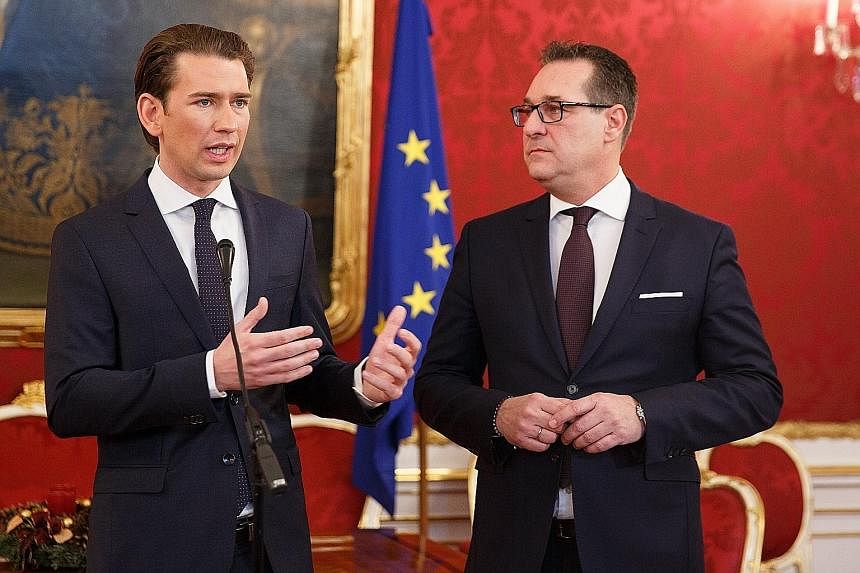VIENNA • Austria is set to become the only western European country with a far-right party in government after the anti-immigration Freedom Party (FPO) and Mr Sebastian Kurz's conservative People's Party (OVP) struck a coalition deal.
The heads of the two parties yesterday briefed the President on their new coalition deal, following elections that saw the Alpine country swing to the right. They were also expected to announce the deal's contents later yesterday, after obtaining formal approval from their party leaderships.
The OVP and Mr Heinz-Christian Strache's FPO struck the deal late on Friday, setting Mr Kurz up to become chancellor - and the world's youngest leader at 31. The move also propels the FPO into power for the first time in more than a decade.
The FPO has toned down its anti-European Union rhetoric in recent years and Mr Kurz has been eager to reassure observers that his Cabinet will be pro-European.
A source familiar with the coalition talks said one way to ensure this was to get the FPO, which wants more direct democracy, to agree to exempt Austria's membership of the European Union from any referendum.
Mr Kurz and Mr Strache, however, have spoken out against further political integration in the bloc, for example on social issues.
-
KEY POLICIES OF THE COALITION
-
Austria's main conservative People's Party (OVP) has reached a deal to form a coalition government with the far-right Freedom Party (FPO).
The deal will make Austria the only western European country with a far-right party in government. These are some of the policies the parties have agreed on.
EUROPEAN UNION:
• Oppose deeper political integration among European Union member states; seek to have more powers returned to national governments.
• Oppose Turkey's membership of the bloc.
• Rule out a referendum on the country's membership of the EU.
• Move some departments that deal with European affairs to the chancellery headed by OVP leader Sebastian Kurz.
LAW AND ORDER:
• Introduce tougher minimum sentences for violent and sex crimes.
• Make fighting political Islam a priority.
• Secure Austria's borders nationally to stop illegal immigration until the EU has secured external borders.
• Put more police on the streets.
BUSINESS AND PUBLIC ADMINISTRATION:
• Extend maximum working day to 12 hours from 10.
• Facilitate immigration only for qualified workers in sectors that are struggling to find suitable Austrian employees.
EDUCATION:
• Focus on improving test results in basic skills, and allow children to start school only if their German is good enough.
• Cut social benefits for parents who fail to comply with requirements, like ensuring attendance and their child speaks German well enough.
BUDGET AND TAXES:
• Cut public spending to fund tax cuts
• Not introduce wealth or inheritance taxes.
SOCIAL AFFAIRS:
• Block newcomers from accessing many social services in Austria during their first five years in the country.
• Cap the main basic benefit payment at €1,500 (S$2,400) a month for families, and provide refugees with a "light" version of regular benefits.
• Cut benefits for refugees and turn cash payments into benefits so as to minimise a "pull factor" attracting immigrants to the country.
• Raise the retirement age to reflect Austria's ageing population, although it is not clear yet how.
• Give families an annual tax cut worth €1,500 per child.
The two party leaders yesterday presented their deal to President Alexander Van der Bellen at the imperial palace. The President, who can reject ministers proposed by the parties, said that if everything went as planned there were no obstacles to swearing in the new government early this week.
"In these talks (since the election) we have agreed, among other things, that it is in Austria's national interest to continue to stay in the centre of a strong European Union," Mr Van der Bellen said.
The OVP came first in the Oct 15 vote with 31.5 per cent after Mr Kurz, nicknamed "wunderwuzzi" ("whizz-kid"), rebranded the staid party as his own personal "movement", promising to get tough on immigration and lower taxes.
The anti-immigration FPO came third with 26 per cent of the vote, double the stunning 13 per cent notched up by the Alternative for Germany (AfD) in elections the month before.
Mr Kurz and Mr Strache had stoked concerns about immigration following a record influx in 2015 and fatigue with the OVP's previous "grand coalition" with the centrist Social Democrats.
This was mirrored elsewhere in Europe, with Mr Geert Wilders' Freedom Party now the second-largest in the Netherlands, France's National Front in a run-off for the presidency in May, and the AfD entering the Bundestag and re-drawing Germany's political map.
"Our aims are quite clear. We want to ease the tax burden for people, we want to strengthen our economy, which will bolster our social system," Mr Kurz said late on Friday. "And first and foremost we want to increase security in our country, including by combating illegal immigration," he told reporters in a joint news conference with Mr Strache.
Mr Strache, 48, is set to be deputy chancellor and press reports suggested that his party has also secured the interior and defence ministries. A seasoned diplomat, Ms Karin Kneissl, close to the FPO but not a member, will be foreign minister, media reports said.
When the FPO last entered government under the late Joerg Haider, who praised Hitler's employment policies, other EU countries imposed sanctions on Vienna in protest.
But a similar outcry is unlikely this time, given the rise of anti-establishment parties across the continent.
REUTERS, AGENCE FRANCE-PRESSE

